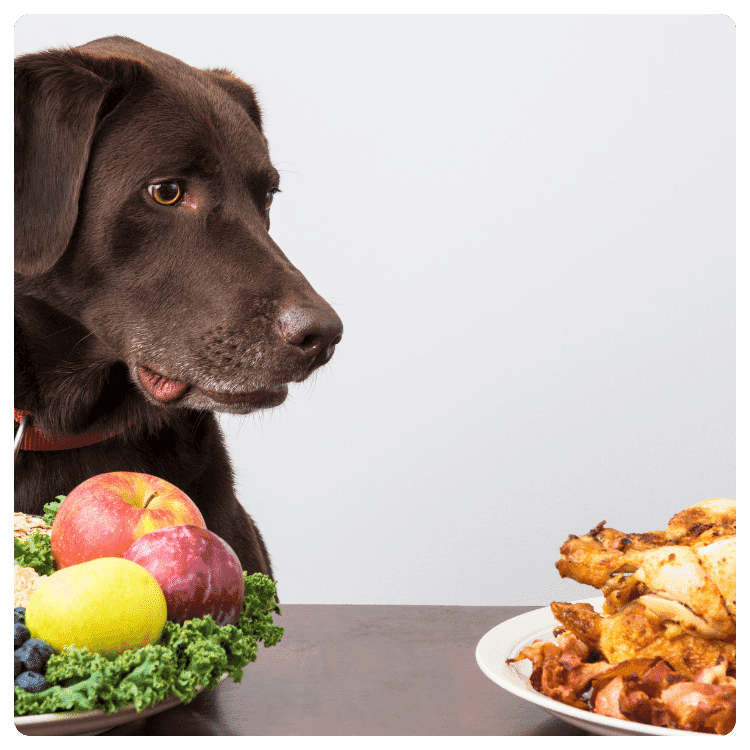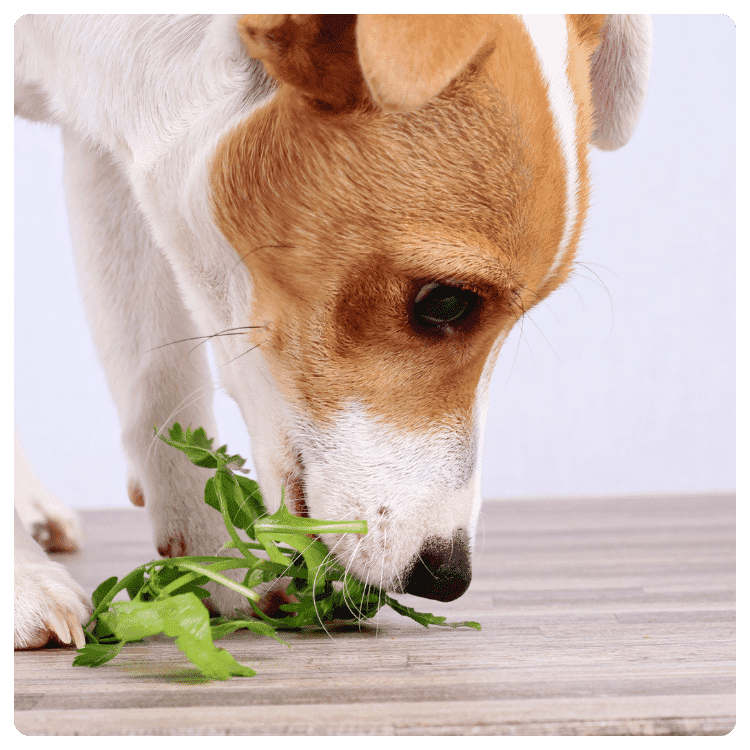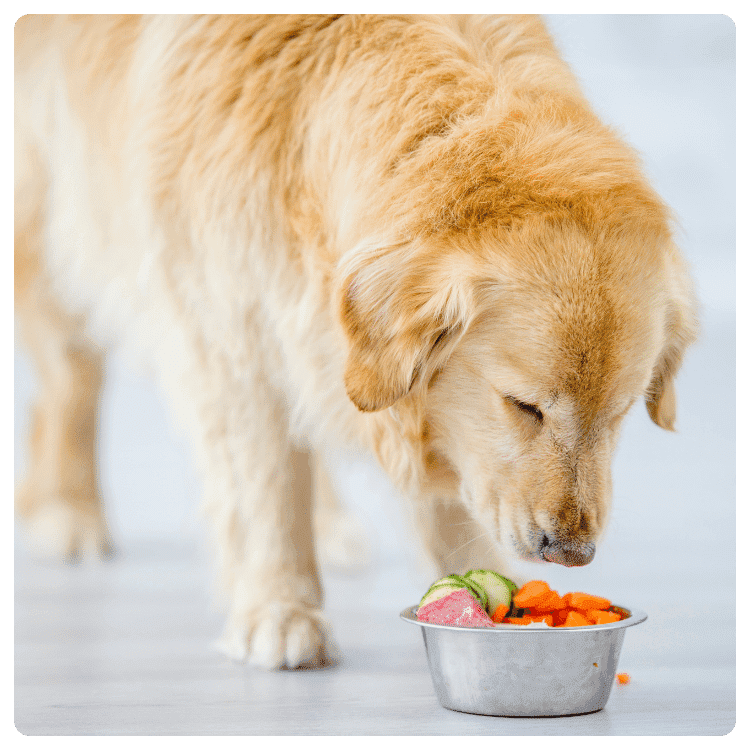How To Make Vegetarian Dog Food At Home: Benefits and Challenges

Vegetarian dog food is formulated to provide all the necessary nutrients that dogs require, using plant-based ingredients instead of animal-derived products. These diets are designed to be nutritionally complete, ensuring that dogs receive adequate protein, vitamins, and minerals for their overall health and well-being. Ingredients commonly found in vegetarian dog food include grains, vegetables, legumes, and fortified nutrients to replace the ones typically obtained from meat.
Why Some Pet Owners Choose a Vegetarian Diet for Their Dogs?

Pet owners may opt for a vegetarian diet for their dogs for a variety of reasons:
- Ethical Concerns: Many pet owners who follow a vegetarian or vegan lifestyle themselves choose to extend their dietary principles to their pets, motivated by concerns about animal welfare and the environmental impact of meat production.
- Health Reasons: Some believe that a vegetarian diet can be beneficial for dogs, potentially reducing the risk of certain health issues such as obesity, allergies, and digestive problems. Specific conditions like food sensitivities to certain proteins might also be managed more effectively with a plant-based diet.
- Environmental Impact: Given the growing awareness of climate change and environmental sustainability, some owners prefer vegetarian diets as a means of reducing their carbon footprint, as plant-based foods generally require fewer resources to produce than meat.
Understanding Dog Nutritional Needs

Dogs require a balanced diet that includes the following essential nutrients:
- Proteins: Proteins are crucial for growth, muscle development, and tissue repair. They are made up of amino acids, some of which are essential and must be obtained from the diet. Sources of protein can include meat, dairy products, eggs, and plant-based options like legumes and grains.
- Fats: Fats provide a concentrated source of energy and are important for maintaining healthy skin and coat, as well as supporting cell function and hormone production. Essential fatty acids, such as omega-3 and omega-6, must be included in the diet.
- Carbohydrates: While not essential, carbohydrates are a good source of energy and fiber, which aids in digestion. They are found in grains, vegetables, and fruits.
- Vitamins: Dogs need various vitamins for metabolic functioning, immune health, and overall well-being. Key vitamins include A, D, E, K, and the B-complex vitamins.
- Minerals: Essential minerals such as calcium, phosphorus, potassium, and zinc are vital for bone health, nerve function, and fluid balance.
Health Effects of a Vegetarian Diet for Dogs

A vegetarian diet for dogs can be nutritionally adequate if it is carefully planned and includes all the essential nutrients. However, there are several health considerations:
- Protein Quality and Quantity: Ensuring adequate high-quality protein is vital. Plant-based proteins can be less digestible and may not provide all essential amino acids in the correct proportions. Supplementation or combining different plant proteins can address this.
- Essential Fatty Acids: Plant-based diets may lack specific omega-3 fatty acids like EPA and DHA, which are primarily found in fish oils. These can be supplemented using algae-based sources.
- Vitamin and Mineral Balance: Certain vitamins and minerals, such as vitamin B12, vitamin D, and calcium, are more readily available in animal products. Vegetarian diets need careful supplementation to avoid deficiencies.
- Digestive Health: High fiber content from plant-based diets can benefit some dogs but may cause digestive issues in others. Monitoring and adjusting fiber levels is important.
- Allergies and Sensitivities: Some dogs may benefit from vegetarian diets if they have allergies or sensitivities to common animal proteins. However, introducing new plant-based ingredients should be done gradually to monitor for any adverse reactions.
- Long-term Health Effects: There is limited research on the long-term health effects of vegetarian diets in dogs. While some dogs may thrive, others might develop deficiencies or health issues over time.
Benefits and Challenges of Vegetarian Dog Food

Benefits
- Improved Skin and Coat Health: Certain plant-based ingredients, such as flaxseed oil and coconut oil, are rich in essential fatty acids like omega-3 and omega-6, which promote healthy skin and a shiny coat.
- Reduced Risk of Food Contaminants: Vegetarian dog foods may eliminate the risk of exposure to contaminants commonly found in meat products, such as antibiotics, hormones, and pesticides, providing a cleaner and safer diet for dogs.
- Lower Risk of Certain Health Conditions: Some studies suggest that vegetarian diets may help reduce the risk of certain health conditions in dogs, such as cancer, heart disease, and kidney disease, although more research is needed to confirm these benefits.
- Sustainable Sourcing: Many vegetarian dog food brands prioritize sustainable sourcing of ingredients, using organic and locally sourced produce whenever possible, which supports environmentally friendly farming practices.
- Variety of Flavors and Textures: Vegetarian dog food offers a wide variety of flavors and textures, including different vegetables, grains, and legumes, providing dogs with a diverse and enjoyable eating experience.
- Promotes Digestive Health: Vegetarian dog foods are often rich in fiber from plant-based ingredients such as fruits, vegetables, and grains. This high fiber content can promote digestive health by supporting regular bowel movements, preventing constipation, and reducing the risk of gastrointestinal issues like bloating and diarrhea. Additionally, fiber can help regulate blood sugar levels and promote a feeling of fullness, contributing to overall digestive wellness in dogs.
Challenges
- Nutritional Balance: Designing a vegetarian diet that meets all of a dog’s nutritional requirements can be challenging. Dogs require a balanced intake of protein, fats, carbohydrates, vitamins, and minerals, which may be more difficult to achieve with plant-based ingredients alone.
- Protein Quality and Quantity: Plant-based proteins may not always provide the same quality or quantity of essential amino acids as animal proteins. Ensuring adequate protein intake, as well as the correct balance of amino acids, is crucial for maintaining muscle mass, immune function, and overall health.
- Essential Nutrient Deficiencies: Vegetarian diets may lack certain essential nutrients that are more readily available in animal products, such as vitamin B12, vitamin D, taurine, and specific omega-3 fatty acids (EPA and DHA). These deficiencies can lead to health issues over time if not properly addressed through supplementation or careful diet planning.
- Digestive Sensitivities: While high fiber content in vegetarian diets can benefit some dogs by improving digestive health, it may cause digestive upset or gastrointestinal issues in others, particularly those with sensitive stomachs or specific dietary intolerances.
- Palatability and Acceptance: Some dogs may be reluctant to accept or enjoy vegetarian dog food due to differences in taste, texture, or aroma compared to traditional meat-based diets. Encouraging acceptance may require patience and experimentation with different recipes and ingredients.
- Cost: High-quality vegetarian dog food, especially those formulated with organic or specialty ingredients, may be more expensive than conventional meat-based options. Balancing cost considerations with nutritional quality and sustainability can be challenging for pet owners on a budget.
Key Ingredients in Vegetarian Dog Food
Proteins
- Lentils: A great source of plant-based protein and fiber, lentils also provide essential nutrients like iron, folate, and manganese.
- Chickpeas: Rich in protein, fiber, and essential vitamins and minerals, chickpeas support digestive health and provide a good energy source.
- Quinoa: This complete protein contains all nine essential amino acids and is also high in fiber, magnesium, B vitamins, and antioxidants.
- Tofu: Made from soybeans, tofu is a high-protein ingredient that also offers calcium and iron. It’s a versatile ingredient that can be incorporated into various recipes.
- Tempeh: Another soy-based protein, tempeh is fermented, making it easier to digest while providing protein, probiotics, and vitamins.
Carbohydrates
- Brown Rice: A whole grain that provides complex carbohydrates, fiber, and essential nutrients such as magnesium, phosphorus, and B vitamins.
- Oats: High in soluble fiber, oats are beneficial for digestion and also provide a good source of protein, iron, and B vitamins.
- Sweet Potatoes: Rich in vitamins A and C, potassium, and fiber, sweet potatoes are a nutritious carbohydrate source with a natural sweetness that dogs enjoy.
- Barley: A whole grain that provides fiber, vitamins, and minerals, barley supports digestive health and provides a steady release of energy.
Fats
- Flaxseed Oil: High in omega-3 fatty acids, flaxseed oil supports skin and coat health, reduces inflammation, and promotes heart health.
- Coconut Oil: Provides medium-chain triglycerides (MCTs) that are easily digestible and can provide quick energy. It also has antimicrobial properties.
- Olive Oil: Rich in monounsaturated fats and antioxidants, olive oil supports heart health and provides essential fatty acids for overall well-being.
Vitamins and Minerals
- Leafy Greens (Spinach, Kale): Packed with vitamins A, C, and K, as well as iron, calcium, and fiber, leafy greens are nutrient-dense additions to a dog’s diet.
- Carrots: High in beta-carotene (vitamin A), fiber, and antioxidants, carrots support eye health, immune function, and digestion.
- Peas: Provide protein, fiber, vitamins A, B, and K, and minerals like iron, magnesium, and potassium. Peas are also a good source of energy.
- Supplements: To ensure a complete and balanced diet, vegetarian dog foods often require supplements for nutrients that might be deficient, such as:
- Vitamin B12: Essential for nerve function and red blood cell formation, often lacking in plant-based diets.
- Taurine: An amino acid critical for heart health and vision, commonly supplemented in vegetarian diets.
- Calcium and Vitamin D: Important for bone health, often requiring supplementation if not adequately provided by plant sources.
- Omega-3 Fatty Acids (EPA and DHA): Typically found in fish oil but can be sourced from algae-based supplements.
By incorporating these key ingredients, vegetarian dog food can be designed to meet the nutritional needs of dogs while adhering to ethical and environmental considerations. Regular consultation with a veterinarian is essential to ensure that the diet remains balanced and healthy.
Recipes for Homemade Vegetarian Dog Food

Recipe 1: Lentil and Vegetable Stew
Ingredients:
- 1 cup lentils
- 2 carrots, chopped
- 1 cup spinach, chopped
- 1 sweet potato, diced
- 1 tablespoon olive oil
Preparation Steps:
- Rinse Lentils: Rinse the lentils thoroughly under cold water.
- Cook Lentils: In a large pot, add the lentils and cover with water. Bring to a boil, then reduce to a simmer and cook for about 20-25 minutes, or until tender.
- Prepare Vegetables: While the lentils are cooking, chop the carrots, spinach, and sweet potatoes.
- Cook Vegetables: In a separate pot, heat the olive oil over medium heat. Add the carrots and sweet potatoes and sauté for about 5 minutes.
- Combine and Simmer: Add the cooked lentils and enough water to cover the vegetables. Bring to a boil, then reduce to a simmer. Cook for another 15-20 minutes, or until the vegetables are tender.
- Add Spinach: Stir in the chopped spinach and cook for an additional 5 minutes.
- Cool and Serve: Allow the stew to cool before serving it to your dog.
Recipe 2: Quinoa and Chickpea Bowl
Ingredients:
- 1 cup quinoa
- 1 can chickpeas, rinsed and drained
- 1 cup peas
- 2 carrots, chopped
- 1 tablespoon flaxseed oil
Preparation Steps:
- Cook Quinoa: Rinse the quinoa under cold water. In a pot, combine the quinoa with 2 cups of water. Bring to a boil, then reduce to a simmer and cook for about 15 minutes, or until the water is absorbed and the quinoa is fluffy.
- Prepare Vegetables: While the quinoa is cooking, chop the carrots.
- Cook Vegetables: In a pot, steam the peas and carrots until tender, about 10 minutes.
- Combine Ingredients: In a large bowl, combine the cooked quinoa, chickpeas, steamed peas, and carrots.
- Add Flaxseed Oil: Drizzle the flaxseed oil over the mixture and stir well to combine.
- Cool and Serve: Allow the mixture to cool before serving it to your dog.
Recipe 3: Tofu and Brown Rice Mix
Ingredients:
- 1 cup tofu, cubed
- 1 cup brown rice
- 1 cup green beans, chopped
- 2 carrots, chopped
- 1 tablespoon coconut oil
Preparation Steps:
- Cook Brown Rice: In a pot, combine the brown rice with 2 cups of water. Bring to a boil, then reduce to a simmer and cook for about 45 minutes, or until the rice is tender.
- Prepare Vegetables: While the rice is cooking, chop the green beans and carrots.
- Cook Tofu: In a pan, heat the coconut oil over medium heat. Add the cubed tofu and sauté until golden brown, about 5-7 minutes.
- Cook Vegetables: In a separate pot, steam the green beans and carrots until tender, about 10 minutes.
- Combine Ingredients: In a large bowl, combine the cooked brown rice, tofu, steamed green beans, and carrots.
- Cool and Serve: Allow the mixture to cool before serving it to your dog.
These homemade vegetarian dog food recipes can provide balanced and nutritious meals for your dog. Ensure you consult with a veterinarian to make sure these recipes meet your dog’s specific dietary needs.
Safety and Health Considerations for Vegetarian Dog Diets

Signs of Nutritional Deficiencies to Watch Out For
- Poor Coat Condition: Dull, dry, or brittle fur can indicate deficiencies in essential fatty acids, such as omega-3 and omega-6.
- Skin Problems: Itchy skin, hot spots, or dermatitis may suggest insufficient intake of key nutrients like vitamins A and E.
- Digestive Issues: Diarrhea, constipation, or excessive gas can be signs of digestive disturbances due to dietary imbalances or sensitivities.
- Weight Changes: Sudden weight loss or gain without changes in activity level could indicate inadequate calorie intake or improper nutrient absorption.
- Lethargy: Lack of energy or reduced activity levels may be linked to insufficient protein or essential vitamins and minerals.
- Dental Problems: Dental issues such as gum disease or tooth decay may signal deficiencies in calcium or vitamin D, affecting bone health.
Importance of Regular Vet Check-Ups
- Nutritional Assessment: Veterinarians can evaluate your dog’s overall health and nutritional status, identifying any deficiencies or imbalances early on.
- Health Monitoring: Regular check-ups allow vets to monitor your dog’s weight, body condition, and vital signs, providing insight into their overall well-being.
- Preventive Care: Vets can recommend preventive measures such as vaccinations, parasite control, and dental care to keep your dog healthy and resilient.
- Early Detection of Health Issues: Routine exams enable vets to detect and address health issues promptly, minimizing the risk of complications and improving treatment outcomes.
Monitoring Your Dog’s Health and Adjusting the Diet as Needed
- Observation: Pay attention to changes in your dog’s behavior, appetite, and physical appearance. Note any unusual symptoms or signs of discomfort.
- Regular Weigh-Ins: Monitor your dog’s weight regularly to ensure they are maintaining a healthy body condition. Sudden weight loss or gain may indicate dietary issues.
- Consultation with Veterinarian: Seek guidance from your vet if you notice any concerning signs or if you’re unsure about your dog’s nutritional needs. They can provide personalized recommendations based on your dog’s health status and dietary requirements.
- Dietary Adjustments: Based on your vet’s advice, make necessary adjustments to your dog’s diet to address nutritional deficiencies or imbalances. This may involve adding supplements, changing portion sizes, or introducing new ingredients.
- Gradual Transitions: When making dietary changes, transition gradually to avoid digestive upset. Monitor your dog’s response to the new diet and make further adjustments as needed.
Cost and Time Considerations

Cost Comparison: Homemade vs. Commercial Vegetarian Dog Food
- Homemade Vegetarian Dog Food:
- Cost: The cost of homemade vegetarian dog food can vary depending on the ingredients used and their availability. While individual ingredients may be affordable, sourcing high-quality, organic ingredients can increase the overall cost.
- Potential Savings: Homemade dog food may offer potential cost savings compared to premium commercial options, especially if you can purchase ingredients in bulk or utilize leftovers from your meals.
- Commercial Vegetarian Dog Food:
- Cost: Commercial vegetarian dog food typically comes with a price tag, especially premium brands that use high-quality ingredients and undergo rigorous quality control.
- Convenience: While commercial options may be more expensive upfront, they offer convenience and consistency, saving you time and effort in meal preparation.
Time Management Tips for Preparing Homemade Vegetarian Dog Food
- Batch Cooking: Prepare large batches of homemade dog food at once and portion it into individual servings for easy storage and use throughout the week.
- Meal Planning: Plan your dog’s meals in advance, taking into account their nutritional needs and ingredient availability. This can streamline the cooking process and ensure balanced nutrition.
- Use Time-Saving Appliances: Utilize kitchen appliances such as slow cookers, pressure cookers, or food processors to expedite meal preparation and minimize hands-on cooking time.
- Simplify Recipes: Opt for simple recipes with minimal ingredients and preparation steps to save time and effort while still providing nutritious meals for your dog.
- Preparation Routine: Establish a regular schedule for preparing homemade dog food, allocating dedicated time slots each week for meal planning, shopping, and cooking.
Conclusion
In conclusion, providing a balanced and nutritious vegetarian diet for dogs requires careful consideration, planning, and monitoring. While vegetarian diets can offer ethical, health, and environmental benefits, it’s crucial to consult with a veterinarian before making dietary changes to ensure your dog’s nutritional needs are met. With proper guidance and attention to detail, vegetarian dog food can be a healthy and sustainable option for your furry companion.








































